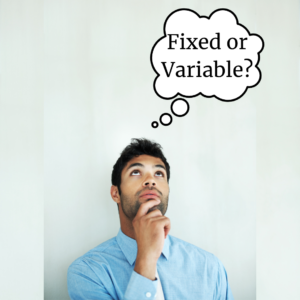
Choosing between a fixed and a variable rate mortgage requires a bit of thought. Both have advantages but there are significant differences between the two.
Variable Rate Mortgages
A variable rate mortgage has an interest rate that can fluctuate over time, while a fixed rate mortgage has an interest rate that remains the same throughout the life of the loan.
Variable rate mortgages can have vastly lower pre-payment penalties for paying the mortgage off early. Further, there are two types of variable rate mortgages. Adjustable rate mortgages are called ARMs for short, and static payment variable rate mortgages are known as VRMs. Though both have rates that fluctuate, the difference is in whether the payment fluctuates with changes in the rate.
As the prime rate rises or falls, so does the interest rates on an adjustable rate mortgage, or ARM. This can be beneficial as rates decrease, as it leads to lower monthly payments. However, if rates increase, the monthly payment on a variable rate mortgage can also increase. The length of time it takes to repay this loan does not change as rates fluctuate.
Like fixed rate mortgages, with a static payment variable rate mortgage, or VRM, the payment is fixed. The portion of the payment going to interest increases and decreases as the rate fluctuates. The amount of the payment going toward the principal increases and decreases at the same time. As interest rates rise, the length of time it will take to repay the entire mortgage lengthens. As interest rates fall, your mortgage will be paid down faster.
Fixed Rate Mortgages
Fixed rate mortgages have interest rates that remain the same throughout the term. This provides borrowers with the security of knowing exactly what their monthly payments will be and what their rate will be over the period. However, if interest rates in the market decrease, borrowers with a fixed rate mortgage may miss out on the opportunity to save money with a lower rate. Also, penalties on fixed rate mortgages can often be far greater than those of variable rates.
When deciding between a variable and fixed rate mortgage, it’s important to consider your own financial situation and goals. If you’re comfortable with a bit of uncertainty and are willing to take on the risk of potentially higher monthly payments or a longer repayment period, a variable rate mortgage may be a good option. However, if you prefer the predictability of a fixed rate, this may be a better fit. Ultimately, the right choice will depend on your individual circumstances.
As always, please give me a call if you have any mortgage questions, I am here to help.